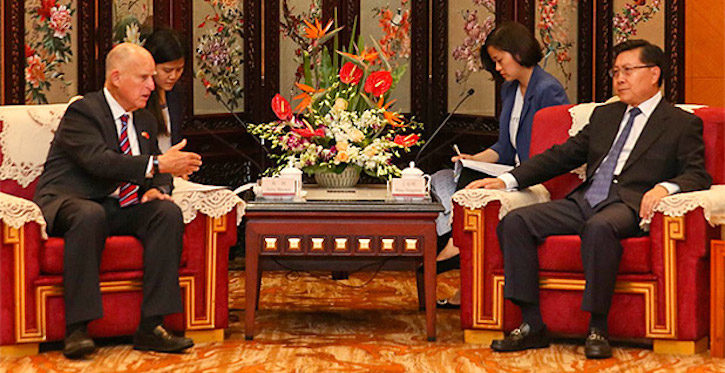
By Kate Gordon
Last Thursday’s withdrawal by President Trump from the Paris climate agreement signaled an aggressive retreat by the U.S. from the international climate community.
In sharp contrast, China’s recent actions demonstrate an equally aggressive turn toward a more global approach—not only on climate, but on clean energy markets and technologies as well.
The U.S. retreat from the climate accord has been met with criticism from world leaders who had looked to the United States for leadership. A slew of top U.S. CEOs expressed concern that the withdrawal will harm the U.S. economy. Paulson Institute Chairman Hank Paulson noted: “We can’t afford to continue making policy decisions that cede our leadership role in the world. And we can’t afford to be laggards on addressing climate change – time is of the essence.”
China’s increasingly international approach to economic growth isn’t confined to the energy and climate space. In May, China rolled out its ambitious “One Belt, One Road” policy, a major investment in infrastructure and trade routes from Asia-Pacific through the Middle East and into Europe, which McKinsey has called “arguably [China’s] most ambitious economic and diplomatic program since the founding of the People’s Republic.”
The project is just the latest—though surely the largest—articulation of China’s global economic reach. Addressing climate change and pollution through a transition to a cleaner, lower-carbon economy is another example. In developing its climate and energy policies, China has increasingly looked to other countries for partnerships on financing and technology, and has also begun much more aggressively investing in renewable energy and grid modernization projects based outside its borders.
As a result, as the U.S. backs away from international clean energy markets, China is already poised to step in. Doing so will likely include an increase in bilateral cooperation with other jurisdictions committed to continued climate action—including with individual U.S. states like California, Washington, and New York, which have joined mayors, universities, and major corporations to reiterate their commitment to the Paris agreement goals.
That’s the good news. Important U.S.-China climate collaboration will continue—but at a subnational level. California is particularly significant due to the state’s size, clean tech leadership, and prior history of bilateral collaboration with China on environmental issues. California’s Governor Jerry Brown is in China this week for a series of key meetings focused on clean energy market development, deployment, and investment. Governor Brown, called by some “America’s unofficial ambassador” on climate change, is participating in several provincial-level meetings to discuss potential cross-border investment into key energy technologies, as well as to attend the official Clean Energy Ministerial, which U.S. Energy Secretary Rick Perry is also expected to attend. The Governor’s presence will help cement several ongoing California-China initiatives, including on carbon pricing through a cap-and-trade system, where California serves as a technical advisor to China.
China’s ongoing relationship with California on these issues is significant. It demonstrates that to many, California is an independent trading partner—the state is the world’s 6th largest economy—as well as a major generator of the innovations that drive emerging clean energy markets. A large majority of all U.S. clean energy patents are registered in California, and the state receives 68 percent of all U.S. clean tech investment. It is a worthy partner for China in the drive to invent, pilot, and commercialize the technologies that will drive the global economy of the future.
The full repercussions of the U.S. withdrawal from the Paris agreement are not yet entirely clear. Neither are the full impacts of China’s all-out drive toward greater global economic reach, in the clean energy arena and beyond. But one thing is certain: climate change is a global issue, and climate solutions represent a global market. The future will belong to those with open arms, not closed fists.




